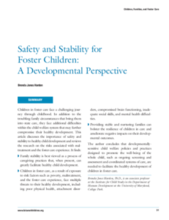“This article discusses the importance of safety and stability to healthy child development and reviews the research on the risks associated with maltreatment and the foster care experience in the United States. It finds:
◗ Family stability is best viewed as a process of caregiving practices that, when present, can greatly facilitate healthy child development.
◗ Children in foster care, as a result of exposure to risk factors such as poverty, maltreatment, and the foster care experience, face multiple threats to their healthy development, including poor physical health, attachment disorders, compromised brain functioning, inadequate social skills, and mental health difficulties.
◗ Providing stable and nurturing families can bolster the resilience of children in care and ameliorate negative impacts on their developmental outcomes.
The author concludes that developmentally sensitive child welfare policies and practices designed to promote the well-being of the whole child, such as ongoing screening and assessment and coordinated systems of care, are needed to facilitate the healthy development of children in foster care.”
© The Future of Children

